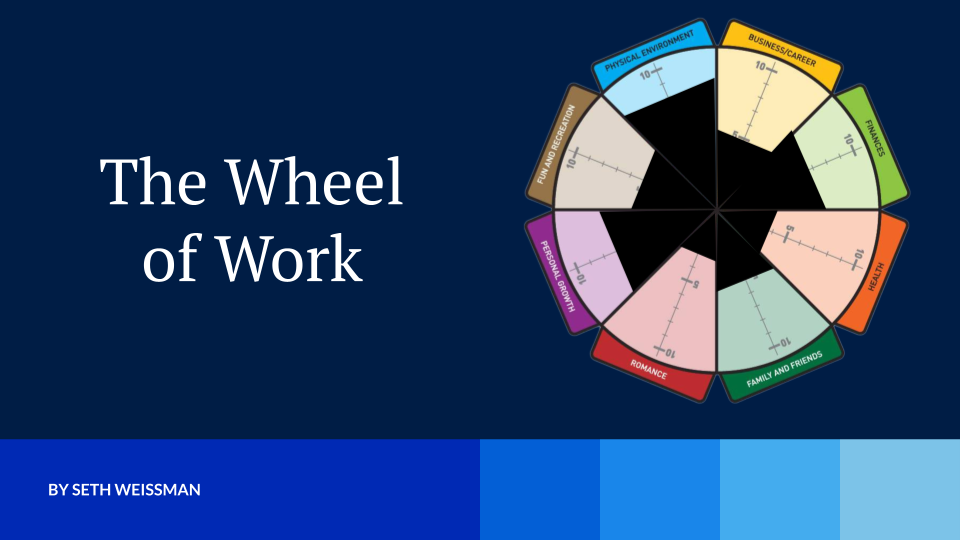Wheel of Work
The "Wheel of Work" is a coaching tool that helps clients gain a deeper understanding of the current state of their professional lives.
At the core of this tool lies the concept of self-awareness and the principle that measuring something is the precondition to improving it. The Wheel of Work comprises eight essential categories, each representing an important aspect of your professional journey. By evaluating and reflecting on these categories, you can cultivate self-awareness, identify areas of resonance or dissonance, and take proactive steps toward achieving your career goals. The eight categories are:
1. My Leader:
This category prompts you to assess the effectiveness of your current leader. Some things you might consider when assessing your leader are their skills at 1) attracting, training, and retaining outstanding talent; 2) caring about each team member as a person, while providing a psychologically safe environment; 3) communicating the company’s vision, mission, values and objectives constantly and coherently; 4) communicating the department’s vision, mission, values and objectives constantly and coherently; 5) motivating and inspiring the team; 6) Empowering the team by delegating responsibility and 7) holding themselves and their team accountable for objective results. A “10” score means you are very satisfied with your current leader on average across these various skills, and a “1” score means you are very unsatisfied with your current leader.
2. The Team I Lead:
As a leader, self-awareness extends to the team's functionality. Evaluate factors such as team dynamics, collaboration, delegation, and overall team performance (both objective and subjective). Understanding your leadership style and its impact on your team allows you to make strategic adjustments, empower team members, and drive collective success. A “10” score means you are very satisfied with the team you lead, and a “1” score means you are very unsatisfied with the team you lead.
3. The Team I Am On:
Assess the overall effectiveness of the team you are on, including your role within the team. Evaluate the collective teamwork skills and the overall effectiveness of your team. Great teams 1) Trust each other; 2) Have productive conflict; 3) commit to each other; 4) hold each other accountable; and 5) focus on collective results. A “10” score means you are very satisfied with the team you are on, and a “1” score means you are very unsatisfied with the team you are on.
4. Amount of Change:
Change is part of life. Measure your satisfaction with the amount of change you currently experience at your business. As most businesses have a high degree of change, resilience, and ability to navigate change effectively typically means you can thrive amidst uncertainty and drive positive outcomes for yourself and your organization. A “10” means you are satisfied with the current amount of change (whether it be constant or tectonic), and a “1” means you find the current rate of change highly dissonant.
5. Work Purpose/Satisfaction:
Self-awareness in work purpose and satisfaction involves aligning your work with your values, passions, and long-term goals. Reflect on your level of satisfaction, fulfillment, and sense of purpose at work. A “10” score means you are very satisfied, and a “1” score means you are very unsatisfied.
6. Work-Life Balance:
Achieving a healthy work-life balance is essential for overall well-being and productivity. Measure how well you manage your time, energy, and priorities to maintain harmony between work and personal life, including how well you prioritize self-care and set boundaries. A “10” score means you are very satisfied with your current balance, and a “1” score means that you are very unsatisfied with your current balance.
7. Work Stress:
Measure your stress levels, recognize triggers, and implement techniques such as mindfulness, time management, and seeking support. By proactively managing stress, you can enhance resilience, improve focus, and maintain well-being in the face of challenges. A “10” score means you are very satisfied with your level of stress, and a “1” score means that you are very unsatisfied with your current level of stress.
8. Rewards and Recognition:
Feeling valued and recognized is crucial for motivation and job satisfaction. Measure the recognition and rewards you receive for your contributions. If you like, you can separate them into two categories: 1) financial rewards, and 2) recognition (praise, acknowledgement, feeling valued). A “10” score means you are very satisfied, and a “1” score means you are very unsatisfied.
The next step is easy: fill in each “pie segment” with your satisfaction rankings for each category. When this is done, you will have a wheel that illustrates how much “balance” you currently have as well as the areas of most resonance and dissonance. A Wheel of Work might look like this:
Look at your completed wheel and answer these questions alone or with your coach: What do you see? Are there any surprises? If this were an actual wheel, how would it roll? Would it roll? What stands out as the most resonant aspect? What stands out as the most challenging aspect? What do you most want to change? Why? What changes can you make to your behavior to impact your satisfaction with some of the key aspects of the Wheel?
I hope the resources shared here are helpful to you on your current journey. On the next page, you will find a wheel for you to complete.
For more thoughts, visit me at sethweissman.com
© 2025 Seth Weissman
© 2025 Seth Weissman



